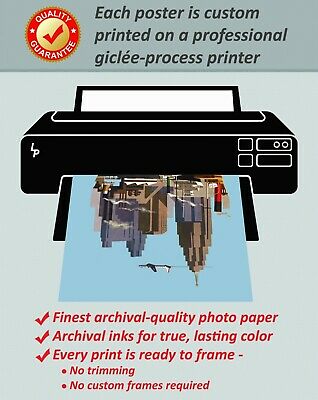-40%
Pacific Electric Railway Map 1913 with Mount Lowe Advertisement
$ 10.53
- Description
- Size Guide
Description
These are simply the best posters available! You will be thrilled with the image quality, vivid colors, fine paper, and unique subjects. This is an original image that has been transformed into a beautiful poster - available exclusively from Landis Publications.OUR POSTERS ARE SIZED FOR STANDARD OFF-THE-SHELF FRAMES, WITH NO CUSTOM FRAMING REQUIRED, PROVIDING HUGE COST SAVINGS!
This beautiful reproduction poster has been re-mastered from a 1913 Pacific Electric Railway system map from Mount Lowe.
The vibrant colors and detail of this classic image have been painstakingly brought back to life to preserve a great piece of history.
The high-resolution image is printed on heavy archival photo paper, on a large-format, professional giclée process printer. The poster is shipped in a rigid cardboard tube, and is ready for framing.
The 13"x19" format is an excellent image size that looks great as a stand-alone piece of art, or as a grouped visual statement. These posters require
no cutting, trimming, or custom framing
, and a wide variety of 13"x19" frames are readily available at your local craft or hobby retailer, and online.
A great vintage print for your home, shop, or business!
History of The Mount Lowe Railway
The Mount Lowe Railway was an engineering masterpiece that took advantage of the rugged mountain scenery above Pasadena, and the proximity to a large population center. In a clever marketing scheme, the builders gave the line’s unique features alluring names that evoked images of a mountain adventure.
The line began fittingly at Mountain Junction, which was located at the present-day site of Lake Avenue and Calavaras Street, in Altadena. The lower section of the line was named The Mountain Division, and it climbed the foothills into Rubio Canyon, and ended at Rubio Pavilion. The 12-room pavilion hotel was tucked neatly into a notch in the canyon, and served as the transfer point to the line’s most distinctive feature, The Great Incline.
The Great Incline was an engineering marvel that used a pair of “funicular” passenger cars to climb and descend a cable-driven incline railway that gained 1,300 feet of elevation over a distance of 3,000 feet. The incline terminated at Echo Mountain, where the facilities included a grand hotel, a large chalet, a spacious dance hall, an observatory, a zoo, repair shops, and a power house.
From the Great Incline, passengers boarded the cars of the Alpine Division, a 3.5-mile route that wound its way through hair-pin curves, over lofty trestles, and through notches blasted from the rocky cliffs. The trolley cars passed through extraordinary topographic and man-made features with names like “Granite Gate,” “Sentinel Rock,” “Circular Bridge,” and “Horseshoe Curve.”
The line terminated at the Alpine Tavern where guests could enjoy a day of hiking or sightseeing, or stay overnight in a comfortable hotel room or tent-cottage. Guests could also enjoy tennis courts, miniature golf, a fox farm, and meandering trails to vista points.
In 1902, Henry Huntington’s Pacific Electric Railway purchased the Mount Lowe line, and made major investments and upgrades to the facilities. The line survived numerous wildfires and floods, as well as the great depression, but it could not withstand the great flood of 1938. The massive downpour devastated the facilities, and forced the final closing and abandonment of the line.













